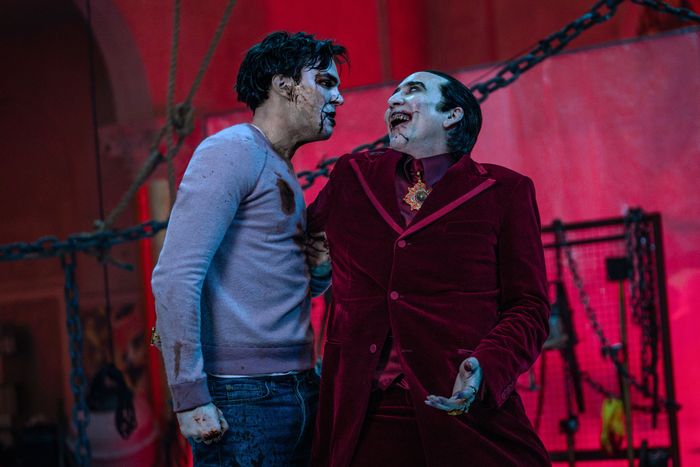
Renfield has a great premise: the relationship between a vampire and its human familiar as basically a dysfunctional workplace dynamic. What are Mr. Burns and Smithers, or Miranda Priestly and Emily Charlton, if not versions of Dracula and Renfield without the supernatural? (Though, to be fair, Burns, with his Three Stooges syndrome, may have achieved his own precarious form of immortality.) Bram Stoker’s Renfield, an unbalanced insect gobbler trying to escape an institution to return to the master responsible for his debased state, is a disturbing vision of someone in thrall to a powerful being who demands absolute loyalty in exchange for promises of immortality — or, in modern parlance, a long-suffering assistant who feels compelled to put up with terrible hours, nonexistent boundaries, and ethical dilemmas in pursuit of a promotion that never seems to materialize.
This is such a catchy premise that for four seasons it has informed one of the central relationships of What We Do in the Shadows, that between Kayvan Novak’s overbearing Nandor the Relentless and Harvey Guillén’s maligned vampire aspirant Guillermo. But to say the show steals Renfield’s thunder implies the movie had much to begin with. Directed by Chris McKay (of the funny enough Lego Batman Movie and the devoutly unfunny Tomorrow War) and written by Ryan Ridley and Robert Kirkman, Renfield has maybe a comedy sketch’s worth of ideas to stretch over a feature-length run time. Whenever Nicholas Hoult and Nicolas Cage are off-screen, the movie feels aimless, as if the actors might at any moment wander off mid-sentence to scope out the craft-services offerings. But Hoult, playing a pallid, anxious, disconcertingly dreamy Renfield, and Cage, fully Cageing it up as the count, manage to be compelling even when vamping (sorry) with all their might to make this material work.
In his most recent roles, Hoult adeptly played an insufferable foodie fanboy in The Menu and an insufferable Russian emperor in The Great; he has a talent for timing and for playing pompous dweebs who never know as much as they think they do. He’s funny in Renfield, even when tasked with doing a full-on record-scratch “You’re probably wondering”–style voice-over, perhaps because his take on that comedy rests on sweetness. He plays the character with an earnest naïveté even while ripping off someone’s arms and using them as projectile weapons, as if despite decades spent finding victims for a vampire lord, enjoying an unnaturally prolonged life, and downing bugs for bursts of extra power, Renfield is still a dithering young man who wants but is afraid to quit his lousy job. Hoult even makes Renfield a plausible romantic lead, though the movie never quite commits to positioning Rebecca, the policewoman played by Awkwafina, as his love interest.
Leaning heavily on the motormouth shtick that has defined most of her roles, Awkwafina feels miscast here, though at least some of that is due to her having to play the only cop in New Orleans who isn’t on the payroll of the Lobo crime family but who’s nevertheless repeatedly shocked when no one wants to help her take down the Lobo crime family. Like Shohreh Aghdashloo, who plays Bellafrancesca, the head of that crime family and the film’s secondary antagonist, and Ben Schwartz, who’s supposed to be her character’s son, Tedward, but mostly seems to be playing himself, Awkwafina actively struggles to pin down the movie’s tone. Only Hoult and Cage seem really to grasp it. Or in the case of Cage, define it. With a mouthful of yellowing, needle-sharp choppers, Cage just goes big, something few performers can do as he can — he makes a meal out of phrases like studio apartment. The best scene between him and his assistant finds Renfield trying to ward off his monstrous master by reading lines from a self-help book as though they were a holy incantation.
The second-best is one in which Renfield finally decides to open up to a support group for people in co-dependent or abusive relationships. Moderated by Brandon Scott Jones as Mark, the support-group scenes are where the premise is explored most enjoyably — if there is a sketch at the heart of this movie, it starts and ends in that church, and all the gory but not especially well staged action really does play like filler. As Renfield rants about his terrible boss to people who have no idea that he’s referring to an ancient vampire, he talks himself around to the affirmation that if he stops helping Dracula, Dracula “won’t come to his full power.” (“That’s so weird,” Mark replies. “Why would you phrase it like that?”) As jokes go, it may not be the first of its kind, but it’s pretty good — just not good enough to sustain the rest of this rickety movie.
More Movie Reviews
- The Accountant 2 Can Not Be Taken Seriously
- Another Simple Favor Is So Fun, Until It Gets So Dumb
- Errol Morris Has Been Sucked Into the Gaping Maw of True Crime


